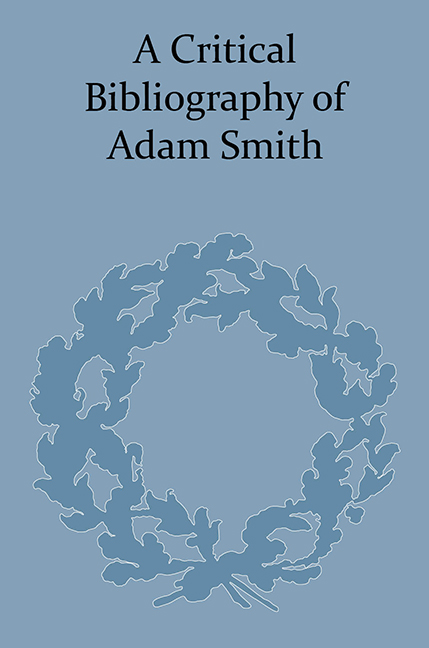Book contents
- Frontmatter
- CONTENTS
- Acknowledgements
- General Introduction
- Early Editions of Adam Smith's Books in Britain and Ireland, 1759–1804
- Adam Smith in English: From Playfair to Cannan
- The Glasgow Edition of the Collected Works of Adam Smith
- The Diffusion of the Work of Adam Smith in the French Language: An Outline History
- The German Reception of Adam Smith
- Adam Smith in Russian Translation
- The Reception of Adam Smith's Works in Poland from the Eighteenth to the Twentieth Centuries
- Adam Smith in the Spanish- and Portuguese-speaking World
- Translations of Adam Smith's Works in Japan
- Adam Smith in China
- Notes to the Bibliographies
- Main Bibliography: All Editions, Chronologically Ordered
- Bibliography by Individual Work
- Bibliography by Language Group
- Note on Dutch Editions
- Note on Italian Editions
- Note on Romanian Editions
- Index
Adam Smith in the Spanish- and Portuguese-speaking World
- Frontmatter
- CONTENTS
- Acknowledgements
- General Introduction
- Early Editions of Adam Smith's Books in Britain and Ireland, 1759–1804
- Adam Smith in English: From Playfair to Cannan
- The Glasgow Edition of the Collected Works of Adam Smith
- The Diffusion of the Work of Adam Smith in the French Language: An Outline History
- The German Reception of Adam Smith
- Adam Smith in Russian Translation
- The Reception of Adam Smith's Works in Poland from the Eighteenth to the Twentieth Centuries
- Adam Smith in the Spanish- and Portuguese-speaking World
- Translations of Adam Smith's Works in Japan
- Adam Smith in China
- Notes to the Bibliographies
- Main Bibliography: All Editions, Chronologically Ordered
- Bibliography by Individual Work
- Bibliography by Language Group
- Note on Dutch Editions
- Note on Italian Editions
- Note on Romanian Editions
- Index
Summary
For the first few decades following 1776 reading Wealth of Nations was a quasi-clandestine activity in a Spain where inquisitorial prohibition and censorship were still a major part of cultural life. It is therefore difficult to form a clear picture of its reception during this period, for all we have are a few scattered references and occasional glimpses of more direct contact with Smith's text, as in the case of Campomanes' commissioning of a translation as early as 1777. Until the 1790s, when the first full translation and various commentaries in Spanish begin to appear, the evidence we have in both Spain and Portugal is largely fragmentary and anecdotal, often hearsay. In Spain it is not clear whether this is attributable to reticence on the part of readers conscious of the power of the Inquisition or, more simply, to a lack of direct knowledge of the text, either in English or in French translation. The second phase, from 1790 to 1812, sees the first translations of Wealth of Nations into Spanish and Portuguese, first via a Spanish version of Condorcet's résumé in 1792; then a full, relatively accurate, though slightly expurgated, Spanish translation in 1794–5, and the first Portuguese version, minus Book V, published in Rio de Janeiro in 1811–12.
This is the period when Smith's direct influence – never, it should be said, very great in Spain and Portugal – was at its height. It inspired Jovellanos's agrarian reform project of 1795, Alcalá Galiano's essay on fiscal reform of 1793 and Souza Coutinho and José da Silva Lisboa's plans for the liberalisation of colonial trade and industry in Brazil, which prompted an interesting debate between a physiocrat and a Smithian liberal in Portugal – the controversy between Rodrigues de Brito and José da Silva Lisboa in 1804–5. It also gave rise to what is probably the most genuinely Smithian work published in the Peninsula, the Essay on Paper Money by Alonso Ortiz, who was also the first Spanish translator of Smith. This important text will be examined later.
- Type
- Chapter
- Information
- A Critical Bibliography of Adam Smith , pp. 184 - 197Publisher: Pickering & ChattoFirst published in: 2014



